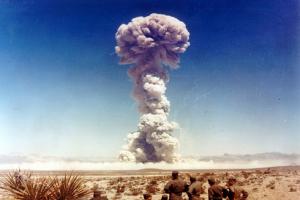Nukes in TurkeyCoup attempt raises fresh questions about safety of U.S. nuclear stockpile in Turkey
To the extent that news coverage of the coup attempt in Turkey touched on how the coup might affect the U.S. military presence in the country, the focus was on air operations the United States has been conducting against ISIS from the Incirlik airbase in southern Turkey. What was not discussed in the media was the fact that the base is home to the largest stockpile of U.S. nuclear weapons in Europe. The coup was the cause of fresh questions about the safety of these weapons, and the wisdom of storing them in such a vulnerable location.

Securing nuclear weapons is becoming a growing worry // Source: theconversation.com
To the extent that news coverage of the coup attempt in Turkey touched on how the coup might affect the U.S. military presence in the country, the focus was on air operations the United States has been conducting against ISIS from the Incirlik airbase in southern Turkey. The base is located sixty-eight miles from the Syrian border.
The base was closed for a few hours, and there were conflicting reports as to whether the post-coup Erdogan government would allow the United States to continue to use the base in the campaign against the Islamist organization.
What was not discussed in the media was the fact that the base is home to the largest stockpile of U.S. nuclear weapons in Europe. The coup was the cause of fresh questions about the safety of these weapons, and the wisdom of storing them in such a vulnerable location.
The New Yorker reports that growing security concerns since the Syrian conflict erupted in 2011 have led to significant improvements and upgrade in the security perimeter around the base – designated as NATO area – where about fifty B61 nuclear bombs are stored in twenty-one secure vaults.
Hans Kristensen, a nuclear weapons expert at the Federation of American Scientists (FAS), notes that the nuclear yield of the B-61 can be adjusted according to the mission. The bomb which was dropped on Hiroshima had an explosive yield equivalent to about fifteen kilotons (15,000 ton) of TNT. The yield of the B-61 bombs can be adjusted from 0.3 kilotons to 170 kilotons.
Another cause for worry was the fact that some of the coup plotters were based at Incirlik, and flew aircraft out of the base, which is shared by the Turkish air force and NATO. As part of the effort to ward off the coup, the Turkish government closed air traffic into and out of the base and cut off its power supply to it.
On Sunday, the base commander, General Bekir Ercan Van, and nine other Turkish officers at Incirlik were detained for supporting the coup.
